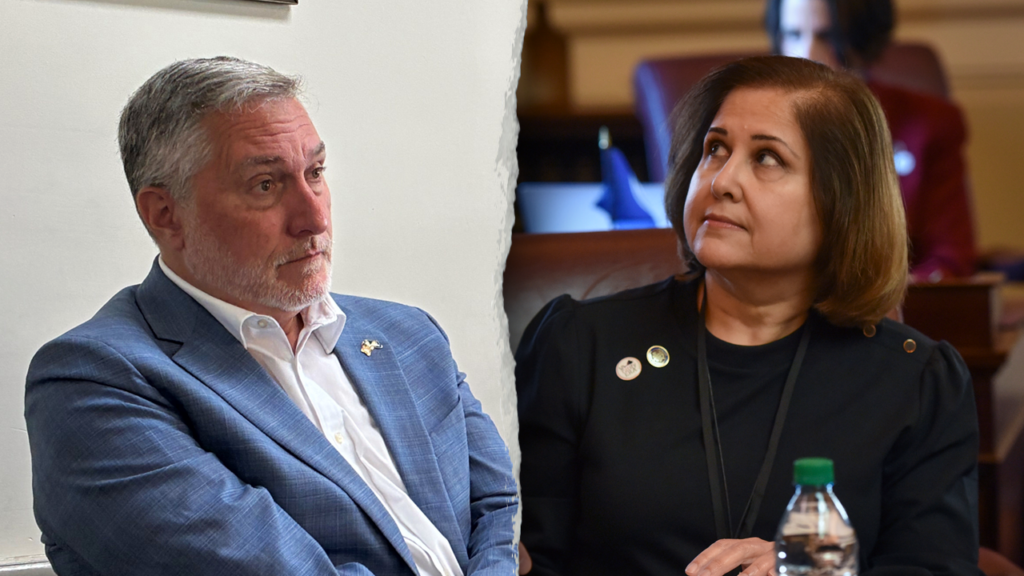In an unprecedented move, conservative businessman and broadcaster John Reid utilized artificial intelligence to simulate a debate with Democratic challenger Ghazala Hashmi for the 2025 lieutenant governor’s race in Virginia. Reid, who has been actively campaigning in Richmond, emphasized that Hashmi is the only candidate among six vying for statewide office to refuse a live debate. The AI-generated representation of Hashmi sparked significant controversy, with her campaign labeling it a “deepfake” and criticizing Reid’s tactics as desperate.
| Article Subheadings |
|---|
| 1) Virginia Candidates Engage in Innovative Debate Tactics |
| 2) Reid’s Justification for Using AI |
| 3) Hashmi’s Response and Concerns over Ethical Concerns |
| 4) The Impact of AI on Political Discourse |
| 5) Looking Ahead: The Future of Campaign Strategies |
Virginia Candidates Engage in Innovative Debate Tactics
The 2025 lieutenant governor race in Virginia is showcasing new creative methods of engagement in political debates. Conservative businessman and broadcaster John Reid has leveraged artificial intelligence to create a mock debate with Democratic challenger Ghazala Hashmi, a move that has sparked significant discussion. Reid’s campaign sought to establish an interactive debate experience, reflecting the changing dynamics of political communication in an increasingly digital world. These innovations come at a time when many voters are seeking transparency and accountability from candidates. While this approach may engage some tech-savvy voters, others are wary of the implications for fair discourse.
Reid’s Justification for Using AI
Reid defended his use of AI during the campaign, asserting that it was necessary to deliver Hashmi’s viewpoints on key issues, since she declined to participate in live debate formats. According to Reid’s representatives, the AI representation was designed to embody Hashmi’s likeness and voice, utilizing her prior public statements and policy positions to generate responses in real-time. Reid expressed disappointment that Hashmi was unwilling to engage directly in live debates, stating, “If she’s not willing to engage in her own campaign for lt gov, I don’t know why anybody thinks she would be able to fight for anything.” This sentiment underscores Reid’s belief that direct engagement is crucial in modern political campaigns.
Hashmi’s Response and Concerns over Ethical Concerns
In response to Reid’s AI-generated debate, Hashmi’s campaign characterized the effort as a “deepfake” and a “desperate move” reminiscent of tactics used by previous political figures. Her campaign expressed concern regarding the ethical implications of using AI technology to simulate a candidate’s presence in a debate.
“While we appreciate that ‘AI Ghazala’ did share her vision… it’s pretty clear, Reid only cares about shoddy gimmicks and not governing.”
Hashmi’s representatives emphasized the need for authentic dialogue and criticized the use of technology to replace genuine human interaction in political discussions.
The Impact of AI on Political Discourse
The utilization of artificial intelligence in political debates could signal a shifting landscape for political communication. As technology becomes more ingrained in daily life, the political arena is no exception. Experts in the field of political science and communications express concern that reliance on AI might undermine voters’ trust in political processes. If candidates can create alternate realities using technology, the lines between fact and fiction could become increasingly blurred. In Reid’s scenario, some observers worry that using AI to engage a candidate’s likeness might set a precedent that could be exploited in future campaigns.
Looking Ahead: The Future of Campaign Strategies
As campaigns like Reid’s continue to employ innovative tactics, it raises vital questions for future elections. Will the use of AI in political discourse redefine candidate engagement, or will voters demand more authentic representations of their leaders? The 2025 elections will likely serve as a litmus test for the effectiveness of AI-generated content in winning votes. Political analysts point out that the implications of this technology extend beyond individual campaigns, potentially impacting political strategies at all levels from local elections to national contests.
| No. | Key Points |
|---|---|
| 1 | John Reid employs AI to simulate a debate with Ghazala Hashmi, who declined a live debate. |
| 2 | Reid argues the AI outputs reflect Hashmi’s known positions and prior statements. |
| 3 | Hashmi’s campaign calls the AI-generated debate unethical and a ‘deepfake.’ |
| 4 | Critics raise concerns over the potential erosion of trust in political discourse due to AI technologies. |
| 5 | Future elections may be influenced by evolving technologies in political strategy and candidate engagement. |
Summary
The innovative use of artificial intelligence in the lieutenant governor race between John Reid and Ghazala Hashmi illustrates a significant transformation in political engagement methods. While Reid views AI as a means to amplify discourse and reach voters, Hashmi’s response highlights ethical concerns surrounding authenticity and representation in politics. As candidates increasingly embrace technological advancements, the implications for future elections will require careful consideration of voters’ trust and the integrity of political dialogue.
Frequently Asked Questions
Question: What are the main features of the AI debate conducted by John Reid?
The AI debate was created to mimic Ghazala Hashmi’s likeness and voice; it utilized her prior quotes and policy positions to simulate responses, given her refusal to participate in live debates.
Question: How did Hashmi’s campaign respond to the AI-generated debate?
Hashmi’s campaign described the AI debate as a “deepfake,” criticizing it as an unethical tactic that undermines authentic political engagement.
Question: What potential implications does the use of AI in politics have for the future?
The use of AI in political debates raises concerns about trust and transparency, potentially blurring the lines between reality and simulation, affecting campaign strategies and voter perceptions in future elections.
